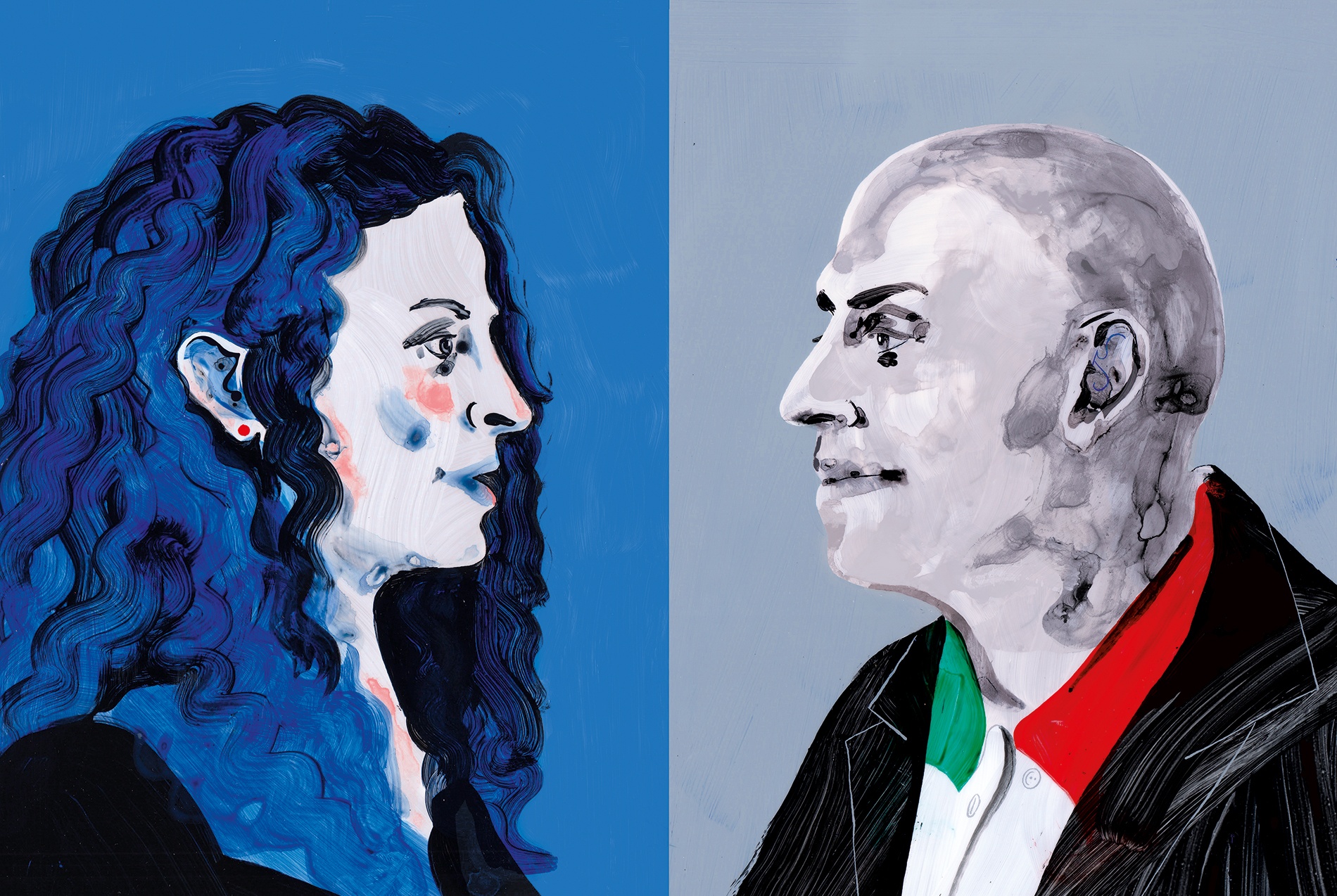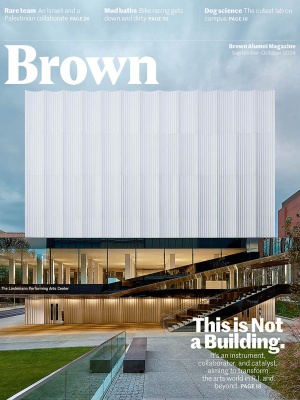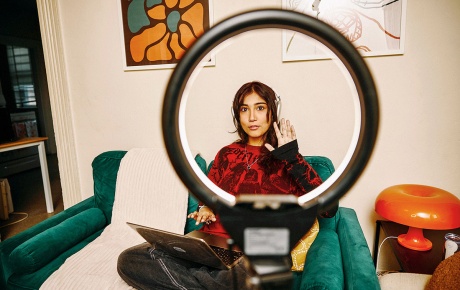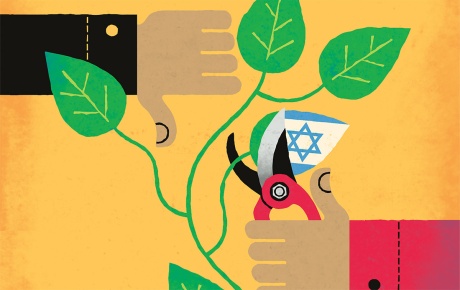
Eye to Eye
Since 2014’s Gaza War, these two professors—one Palestinian, one Israeli—have been working together. They sat down with us to talk about history, censorship, antisemitism, diasporas, and, most of all, peace.
Friends and collaborators Sa’ed Atshan and Katharina Galor published their first book together in 2020. The Moral Triangle: Germans, Israelis, and Palestinians (see page 30) is the result of years of research and interviews in Berlin, home to Europe’s largest Palestinian diaspora community and one of the world’s largest Israeli diaspora communities. One reviewer called the book an “ethical document that exemplifies how scholarship can confront thorny moral and political problems with generosity, nuance, and a strong sense of restorative justice.”
Their professional relationship is remarkable in many ways, but part of the reason that their work has attracted such widespread attention and praise is because Atshan, a former Watson fellow who is now an associate professor of anthropology and peace and conflict studies at Swarthmore, is Palestinian while Galor, Brown’s Hirschfeld senior lecturer in Judaic Studies, is Israeli.
In the years since then, they have continued to collaborate, publishing articles together and speaking at “countless” forums. But it all started over tea on Thayer Street.
You two have done some remarkable work together. How did your professional relationship start?
Katharina Galor We met exactly ten years ago. Strangely enough, our friendship started during the 2014 Gaza War. And here we are ten years later, a whole different kind of Gaza war. Since then, we really haven’t stopped working together.
Sa’ed Atshan At the time, I was a postdoc at Brown and Kati was on the faculty. One of Kati’s former students is Palestinian and my friend Hana, who is a Brown alum, is Jewish American and the daughter of a rabbi.
They both insisted that Kati and I get together socially. They said, you guys really have to connect, like, on a deeper level. So they arranged a tea for us on Thayer Street, at Tealuxe.
The four of us got together and there were just sparks. I mean just the energy, the camaraderie…. After two hours of chatting, we still couldn’t stop. And I don’t think it’s a coincidence that Kati and I met in the context of Brown. There’s something very, very, very special about Brown. It attracts really deep thinkers, profound souls, incredibly thoughtful, socially conscious, globally conscious human beings. And the kinds of relationships that Brown makes possible and the kinds of overlaps of people’s lives and worlds on that campus are really inspiring.
You cover a lot in The Moral Triangle, including Germany’s strong support for the Israeli state and Palestinians experiencing increased racism and Islamophobia. This is all incredibly sensitive subject matter. How was the book received?
Galor We had more invitations than we could accept at universities across the U.S., we went twice to Harvard. There was really a lot of interest.
And as Sa’ed once said, maybe we were the very first co-authors of a book that dealt with the
Israel-Palestine conflict that received an invitation both by the Center for Israel Studies at Brandeis and the Center for Palestine Studies at Columbia University. That’s very difficult to achieve. And so we’re very proud of that. There was immense interest.
How was the book received in Germany?
Galor The book got much less attention in Germany, because these issues that we write about are so much more complicated and intensified in Germany because of the past and Germany’s role in the Holocaust. The Israeli community in Germany is largely made up of all these young intellectuals and artists coming and making a life for themselves in Berlin. And yeah, Germans love that.
“One of the things that makes it possible for Sa’ed and me to work together is that we can relate to each other’s traumas. We’re not engaging in a competitive narrative of whose family has lived through the bigger trauma.”
But when these mostly liberal, young intellectual Israelis criticize the Israeli government, Germans get extremely upset and will sometimes even call them antisemitic Jews, which doesn’t make any sense. So now of all people, we have Germans telling Israeli Jews they’re antisemitic because they’re critical of their country’s government and right-wing politics.
You’ve done a lot of work together since The Moral Triangle. This professional relationship seems to be really productive. Why do you think that is?
Atshan Yes, the collaboration continues. In addition to the co-authored book manuscript, we have a co-edited volume that we published on gender and sexuality in Palestinian and Israeli film. We’ve published a number of articles together and we’re now finishing a book chapter together. And of course we’ve spoken together at countless forums at this point.
Galor At the heart of our work together and our friendship is bringing these respective traumas, the Holocaust and the Nakba, into dialogue. So yeah, after this book we did something wonderfully different, which was the book based on a conference we organized at Brown on gender in Palestinian and Israeli film. We haven’t stopped working together and I think it’s also simply because we both enjoy it.
How common is this kind of collaboration between an Israeli and a Palestinian in the academic world?
Atshan It’s not unprecedented, but it’s very rare these days. In the post-Oslo era, we saw a mushrooming of different forms of partnerships. But we’re now in a very, very different era where we are unfortunately a rare breed: an Israeli scholar and a Palestinian scholar working together on a joint project.
Galor I want to emphasize that one of the things that makes it possible for Sa’ed and me to work together is that we can relate to each other’s traumas. We’re not engaging in a competitive narrative of whose family has lived through the bigger trauma. Sa’ed is very knowledgeable about the Holocaust and is very compassionate and very interested. And he has wanted to hear all the stories I had to tell him about my family, ninety percent of whom were murdered in the camps. And I really want to know how it is to grow up under military occupation. I wanted to hear his personal experience and his family’s experience in the Nakba in 1948.
The other thing that I wanted to mention is that we are both pacifist, and not everybody working on Israel and Palestine is a pacifist. And I think we would have a hard time working together if one or the other would defend the use of weapons.
How has the discourse on Israel and Palestine changed since October 7? Do you have concerns about censorship or curtailing free speech in the context of these conversations?
Galor One of the chapters in our book is actually about censorship. How much can you say about Israel and how much can you say about Palestine and what’s the right wording? It’s very difficult in Germany. There’s real censorship when it comes to being critical of Israel. I think if we had been employed in a German university and we had written this book, we probably would’ve both lost our jobs.
“So we see these knee-jerk false accusations of antisemitism in order to stifle free speech on this issue, which is a disservice to the very noble and important and urgent struggle against very real forces of antisemitism.”
Atshan This has been a longstanding problem in so many contexts, in so many parts of the world for so long now, where there is this conflation between criticism of the Israeli state and antisemitism. And sometimes there is some overlap between the two, but oftentimes there isn’t. So we see these knee-jerk false accusations of antisemitism in order to stifle free speech on this issue, which is a disservice to the very noble and important and urgent struggle against very real forces of antisemitism. So we should simultaneously condemn antisemitism in all of its forms and resist it while at the same time making space for thoughtful critiques of the Israeli government’s human rights violations. It becomes difficult for a Palestinian like me to be able to articulate my struggle while constantly having to be concerned about this policing of discourse.
Galor Yes, there is a lot of tension on campuses and among colleagues and students there. But I also feel that this crisis has actually opened new doors and conversations among scholars that didn’t exist before. I’m affiliated with both the Judaic Studies and the Center for Middle East Studies at Brown, and I feel that I have had more interesting conversations with some of my colleagues in Judaic studies this year than ever in my last 15 years. I don’t necessarily see that all the doors are closed or that there is no conversation possible.
What are your thoughts on the wave of pro-Palestinian campus protests in the U.S.?
Galor I feel the students are courageous and I understand that demonstrations and encampments can make a difference. What I can’t handle is violent speech, aggressive speech, hate speech. I don’t support that. And I think we have seen a lot of different ways that the demonstrations are happening across the country and I think at Brown, we are lucky that it didn’t turn into something violent.
Atshan I would also applaud the Brown community for how they engaged and how they came to a resolution while engaging in those dialogues and discussions. Brown set a really positive example and model in terms of the national higher education landscape at this moment. It’s not easy and it will continue to be challenging, but what a blessing that the situation at Brown didn’t result in some of the repression and heartache that we’ve seen in other contexts.
The past months [since October 7], of course, have been incredibly difficult. But I think it helps to lead a life of meaning and purpose. I think both of us really love what we do. It’s a calling, it’s a passion to be teachers, to be public intellectuals, to be researchers, scholars, to pursue the life of the mind, but also to be committed to peace and justice. And that motivates all that we do. And that’s helped me cope and stay strong. So, fingers crossed that this madness will end soon and fingers crossed that we can maintain our stamina.
Russell Morse is a native San Franciscan living and writing in Providence, Rhode Island.





